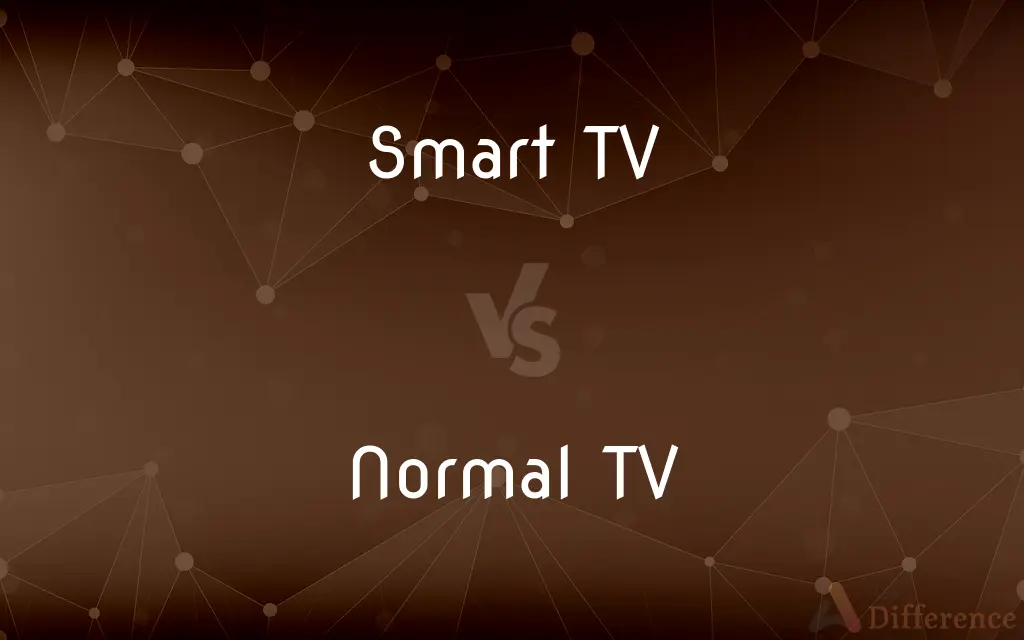Smart TV vs. Normal TV — What's the Difference?
By Tayyaba Rehman — Published on November 4, 2023
Smart TV connects to the internet and supports apps; Normal TV only receives broadcast signals.

Difference Between Smart TV and Normal TV
Table of Contents
ADVERTISEMENT
Key Differences
A Smart TV is essentially a television set with integrated internet capabilities. This allows it to connect directly to Wi-Fi or through an Ethernet cable. With this connectivity, users can stream content, use apps, and even browse the web without needing an external device.
On the other hand, a Normal TV, often referred to as a traditional or standard television, functions primarily as a display for receiving broadcast signals. These TVs might be equipped with ports for HDMI, composite, or component cables, but they do not possess any built-in capabilities to access internet content or applications.
The advancement in technology that gave rise to Smart TVs marked a significant shift in how consumers approached entertainment. While a Normal TV would require external devices like DVD players, gaming consoles, or set-top boxes to view content, a Smart TV integrates these features, offering services like Netflix, Hulu, or Amazon Prime Video directly.
A key distinction between Smart TV and Normal TV is user interactivity. While Smart TVs often come with sophisticated remote controls or even voice recognition, allowing users to search or use apps, Normal TVs have a more straightforward approach, focusing solely on changing channels or adjusting the volume.
To sum up, while both Smart TV and Normal TV offer visual entertainment, the former provides a more interactive and integrated experience by merging internet capabilities with traditional broadcasting, whereas the latter offers a more basic viewing experience.
ADVERTISEMENT
Comparison Chart
Internet Connectivity
Has built-in internet capabilities
Lacks internet capabilities
Applications
Supports apps like Netflix, YouTube, etc.
Cannot run apps
Content Source
Streams content or uses broadcast signals
Primarily relies on broadcast signals
User Interactivity
Advanced (voice recognition, app navigation)
Basic (channel change, volume control)
Additional Devices
Often not needed for streaming
Requires external devices for non-broadcast content
Compare with Definitions
Smart TV
Allows direct online content access.
We downloaded a new movie directly on our Smart TV last night.
Normal TV
Provides a basic user interface.
Changing the channel on the Normal TV is done through the remote's number pad.
Smart TV
Often updates software for improved functionalities.
The Smart TV had a software update yesterday, introducing a new app store.
Normal TV
A television that receives broadcast signals.
The Normal TV in the bedroom is perfect for watching the news.
Smart TV
Contains a more advanced user interface.
I can use voice commands with my Smart TV to change the volume.
Normal TV
Requires external devices for additional functionalities.
We connected a DVD player to our Normal TV to watch movies.
Smart TV
A television with integrated internet features.
The Smart TV in the living room lets us watch Netflix without an external device.
Normal TV
Lacks built-in internet capabilities.
We can't watch YouTube directly on our Normal TV.
Smart TV
Offers app-based content streaming and browsing.
With the Smart TV, browsing YouTube is as simple as clicking an app.
Normal TV
Primarily displays content without interactive features.
The Normal TV displays shows without any added interactive features or apps.
Common Curiosities
Can a Smart TV access the internet?
Yes, a Smart TV can connect to the internet, either wirelessly or through an Ethernet cable.
Can a Smart TV download new apps?
Yes, many Smart TVs have app stores where you can download and install new apps.
Is a Normal TV the same as an old TV?
Not necessarily. A Normal TV can be modern but lacks integrated internet features of a Smart TV.
Do I need a set-top box with a Normal TV to stream content?
Yes, a Normal TV would require a set-top box or another external device to stream content.
Can a Smart TV connect to smart home devices?
Many Smart TVs can integrate with smart home systems, allowing for voice control and automation.
Do Normal TVs always require external devices for additional features?
For features beyond traditional broadcasting, yes, Normal TVs need external devices.
Can I make my Normal TV "smart" with external devices?
Yes, devices like streaming sticks or set-top boxes can add smart functionalities to a Normal TV.
Can a Smart TV run mobile apps?
Yes, a Smart TV often supports various apps similar to mobile devices, like Netflix or YouTube.
Is the picture quality better on a Smart TV than on a Normal TV?
Picture quality depends on resolution and display technology, not on whether the TV is smart or normal.
Do Smart TVs need frequent software updates?
Like other smart devices, Smart TVs periodically receive software updates for improvements and new features.
Do I always need an internet connection to use a Smart TV?
No, a Smart TV can function like a Normal TV without internet, but internet features would be inaccessible.
Can a Normal TV be used as a computer monitor?
Yes, if it has the necessary ports, a Normal TV can serve as a computer monitor.
Can I play games on a Smart TV?
Yes, many Smart TVs offer gaming apps or can connect to gaming consoles.
Are there privacy concerns with Smart TVs?
Some Smart TVs can collect data on viewing habits, so it's essential to review and adjust privacy settings.
Are Normal TVs cheaper than Smart TVs?
Generally, yes. Normal TVs, without added smart features, tend to be more affordable.
Share Your Discovery

Previous Comparison
BMP vs. JPG
Next Comparison
Induced Dipole vs. Permanent DipoleAuthor Spotlight
Written by
Tayyaba RehmanTayyaba Rehman is a distinguished writer, currently serving as a primary contributor to askdifference.com. As a researcher in semantics and etymology, Tayyaba's passion for the complexity of languages and their distinctions has found a perfect home on the platform. Tayyaba delves into the intricacies of language, distinguishing between commonly confused words and phrases, thereby providing clarity for readers worldwide.
















































